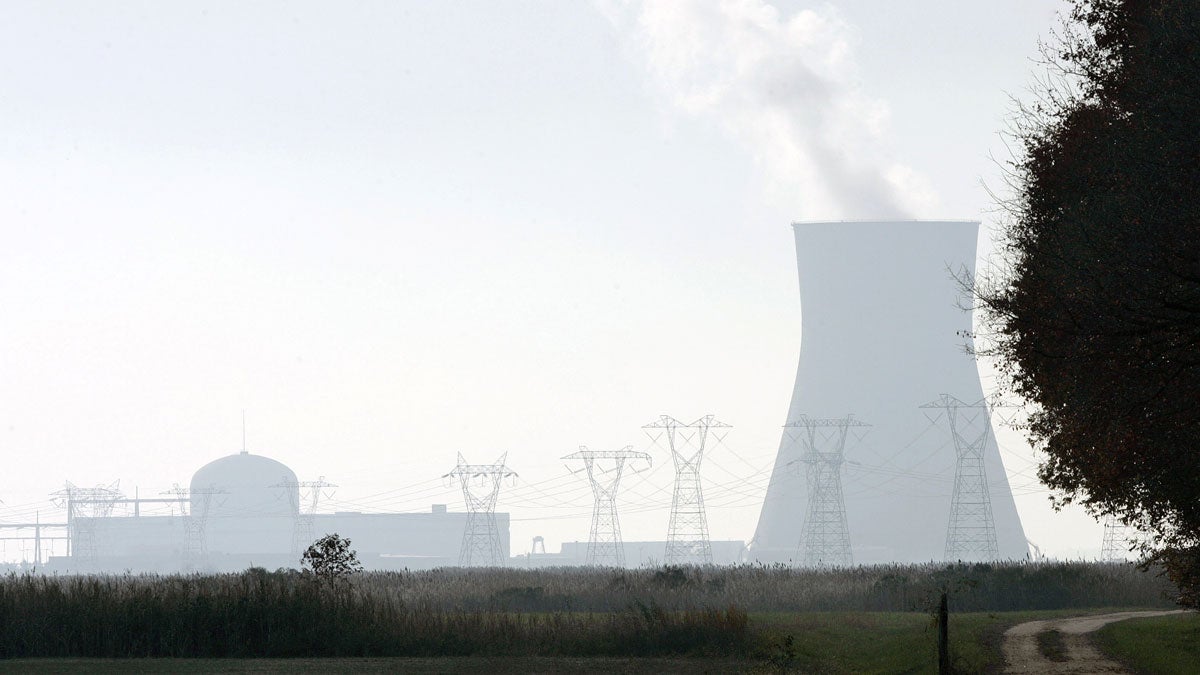PSEG drives home vow to shutter nuclear plants unless public subsidizes them
The company maintains new filings with state demonstrate the case for up to $300 million in annual aid for three years, but most financial information has been redacted.

A large cooling tower and other buildings at the nuclear power site in Salem County can be seen near a farm in Lower Alloways Creek Township, N.J., in rural Salem County Nov. 13, 2007. (Mel Evans, AP, file)
Absent financial help, PSEG Nuclear vows to close its nuclear units in South Jersey within three years, saying the plants are not projected to cover hundreds of millions of dollars in annual expenditures, according to applications submitted to the state.
But the energy company provided no financial information to back up that assertion — at least to the public — in voluminous filings, most of which will remain confidential except to the Board of Public Utilities, its staff and consultants, as well as the Rate Counsel and PJM Independent Market Monitor.
The company contends the redacted financial information — detailing the three units’ finances going back five years and projections by PSEG through 2030 — demonstrates the plants qualify for up to $300 million in annual subsidies from ratepayers for the next three years.
The proposed subsidies, dubbed zero emission credits, were part of a controversial bill signed into law last spring by Gov. Phil Murphy after PSEG successfully pushed through legislation to prop up its Hope Creek and Salem 1 and Salem 2 nuclear units, which face stiff competition from plants burning cheap natural gas. The bill faced opposition from consumer advocates, environmentalists and business groups who argued PSEG failed to demonstrate the plants are not profitable.
Scant information on profits
The redacted filings, made public yesterday by the BPU, offer scant information to answer the question on profitability. Instead, PSEG reiterated arguments made during the legislative debate on the bill, saying the units deserve financial help based on their contribution to improving air quality in New Jersey, for providing fuel diversity and increasing the resiliency of the power grid.
In each of the three separate applications, PSEG made the same basic argument: The units will shut down absent a material financial change. The company’s board of directors already has passed resolutions to that effect, according to PSEG’s filings.
In the application, the company did not state, at least in the non-confidential parts of the application, what kind of financial incentive it is seeking. In the bill signed by the governor, it establishes a charge of $0.004 per kilowatt hour, a charge that could cost customers $300 million annually.
But BPU president Joseph Fiordaliso, in an interview on Friday, said the board is not bound by that number. “They have to prove what they need,’’ Fiordaliso said. “That’s for us to determine what they get.’’
Rate Counsel Stefanie Brand has essentially argued the same point in briefs submitted to the BPU by her office last year. She contended that established utility law would allow the state to adjust the specified legislative rate depending upon the actual economic circumstances of the plants.
PSEG wants subsidies for all three plants
That issue is likely to be a focal point of proceedings before the BPU expected to end this April. PSEG appears committed to obtaining subsidies for each of its three plants.
“PSEG management and the Board concluded that absent a separate material financial change, the plants will cease operations within three years unless all three plants receive ZECs that adequately compensate the plants for their costs and risks,’’ the company concluded.
In its applications, PSEG said power prices for electricity showed some upward movement in 2018, but added that future projected prices remain low while regulatory and compliance costs remain high.
If any of the three nuclear units retire prematurely, New Jersey’s greenhouse gas emissions would increase by 40 percent, according to the applications. If all three retire, greenhouse gas emissions would jump by 70 percent. New Jersey has a goal of reducing global warming emissions by 80 percent by 2050.
The applications also note that if any of the three nuclear units retire prematurely, other air pollutants would increase, including nitrogen oxide, a contaminant that helps form smog, mercury, a highly toxic compound, and particulates, a pollutant that causes thousands of premature deaths every year.
WHYY is your source for fact-based, in-depth journalism and information. As a nonprofit organization, we rely on financial support from readers like you. Please give today.



